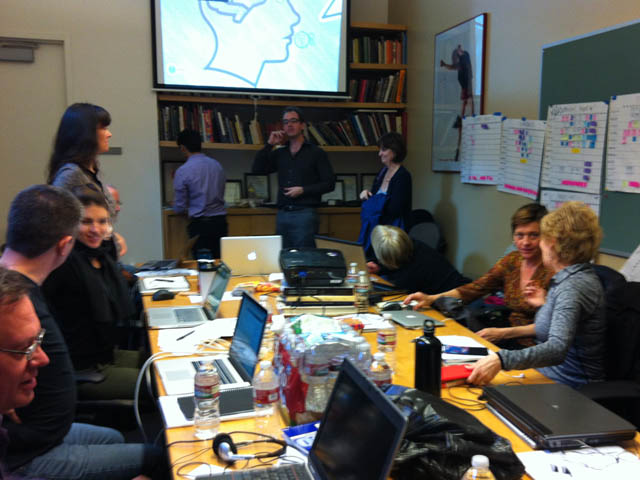
Lo scorso fine settimana ho avuto la fortuna di partecipare ad un seminario di due giorni a San Francisco, diretta da Gabriel Wyner. Gabe ha scritto il libro che sta per essere pubblicato “Fluent Forever”. Sta anche lavorando attualmente sull’affascinante e ambizioso progetto “Pronunciation Trainers” una nuova app per l’ear training dei suoni di una lingua straniera. Pochi mesi fa ho intervistato Gabriel qui sul blog, e quindi è stato un grande piacere incontrarlo in persona. È stato anche un piacere stare in una stanza con quindici altri studenti (matti) appassionati di lingue (come me) e interessati ad imparare nuovi modi per apprenderle.
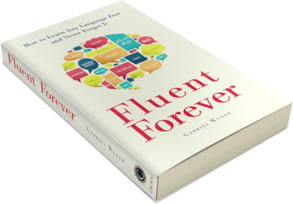
Last weekend I had the good fortune to participate in a 2-day language seminar in San Francisco conducted by Gabriel Wyner. Gabe has written the soon-to-be-published book “Fluent Forever”. He is also currently working on the fascinating and ambitious project: “Pronunciation Trainers” – a new software language app that helps to train your ear to hear all the distinctions in similar-sounding words in other languages. A few months ago I interviewed Gabriel here on the blog, and so it was a great pleasure to meet him in person. It was also an extreme pleasure to be in a room with 15 other passionate crazy language learners, (just like me) interested in finding new ways to learn a language efficiently.
I concetti che Wyner insegna possono essere applicati a tutte le lingue e in totale c’erano 15 studenti di varie lingue: italiano, francese, spagnolo, portoghese, giapponese, russo e cinese. Sono contenta di dire che tra tutte le lingue la lingua italiana ha dominato! Sono anche molto contenta di dire che due degli studenti che studiano l’italiano erano lì grazie al mio blog! Avevano scoperto di Gabe dopo aver letto del suo progetto di Kickstarter proprio qui! È stato bello conoscervi Tony e Marcia!
The concepts Wyner teaches apply to all languages and there were in total 15 students of many languages: Italian, French, Spanish, Portuguese, Japanese, Russian, and Chinese. Of all the languages, however, I am pleased to say that the Italian language dominated. I am also very pleased to say that two of the other Italian participants were there because of the Matta blog! They had discovered Gabe and his project by reading about his Kickstarter project right here! So nice to meet you, Tony & Marcia!
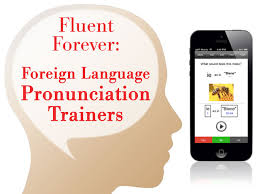
Anche se il seminario era diretto ai principianti, ho trovato informazioni utili per l’apprendimento linguistico avanzato. Gabe ha parlato molto di come il cervello ricorda e memorizza le informazioni. Come risultato ho un una comprensione nuova per gli mnemonici e di come siano strumenti potenti per ricordare informazioni casuali attraverso un processo di visualizzazione e connessioni personali. La visualizzazione può essere applicata non solo per imparare il vocabolario, ma può anche essere applicata alla grammatica. Abbiamo provato questa teoria imparando in circa cinque minuti i generi di 12 parole tedesche. Ricordate che questo compito è reso ancora più difficile dal fatto che ci sono 3 generi nella lingua tedesca ed i nomi stessi non ci daranno alcun indizio sul loro genere di cui avete bisogno. Attraverso la creazione di immagini forti per ogni genere tedesco (femminile, maschile e neutro) il gruppo ha appreso i generi di molte parole a caso in poco tempo. La parte migliore, è che dopo una settimana riesco ancora a ricordarne i generi. Ho intenzione di applicare ciò che ho imparato alle preposizioni italiane!
Although the seminar was directed to beginning language learners I found useful information for advanced learners as well. Gabe talked a lot about how the human brain remembers and stores information. As a result, I have an even greater appreciation for mnemonics and how they can be a powerful tool for remembering random information through a process of visualization and personal associations. Visualization can be applied not only to learning vocabulary but also can be applied to grammar as well. We tested this theory by learning in about 5 minutes the genders to 12 random German words. Remember that this task is made even harder by the fact that there are 3 genders in the German language and the nouns themselves give you no clue as to the gender it needs. By creating a strong visual image for each German gender (feminine, masculine, and neuter) the entire group learned the genders of a bunch of random words in record time. The best part, after a week I can still recall the genders. I will be applying what I learned to Italian prepositions!

Gabe è anche un grande sostenitore di Anki, un programma di flash card che rende il ricordo di una informazione più facile. È possibile utilizzare Anki (che trovo molto simile a Memrise) per creare carte mnemoniche, con le immagini (che si trovano su Google) e con le registrazioni (che si trovano su Forvo) per allenare il tuo orecchio su come si pronuncia una parola. Siccome è molto più efficiente, rispetto ai metodi di studio tradizionali, è possibile ridurre il tempo trascorso nell’apprendimento e aumentare la quantità di quello che si può imparare.
Gabe is also a big proponent of Anki, a spaced repetition flashcard program which makes remembering things easy. You can use Anki (which I also find to be similar to Memrise) to create your own mnemonic cards with images found on Google image search and sound bites using FORVO (see below) to train your ear to how a word is pronounced. Because it’s a lot more efficient than traditional study methods, you can either greatly decrease your time spent studying, or greatly increase the amount you learn.
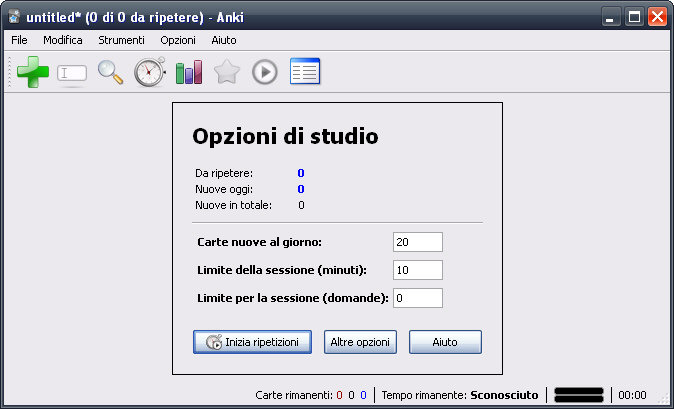
Altre informazioni che ho trovato utili: / Other great take aways I learned from the seminar:
Imparare una lingua è un viaggio. Siate pazienti con voi stessi. C’è un processo evolutivo e naturale che i nostri cervelli devono seguire. I principianti imparano una lingua come fa un bambino, e quindi all’inizio è facile essere frustrati perché non stiamo ricordando le parole o concetti abbastanza velocemente. Dopo tutto siamo adulti intelligenti e questo dovrebbe essere un gioco da ragazzi!
Learning a language is a journey. Be patient with yourself. There is a natural evolutionary process that our brains must follow. Beginners learn a language as a child does and it is easy to become frustrated because we are not remembering words well or concepts fast enough. After all, we are intelligent adults and this should be a snap!
Finchè ci si diverte si sta imparando. Quando un metodo diventa noioso, fate qualcosa di diverso. Cercate d’imparare una base solida di circa 600 parole. Imparate anche la grammatica. Vi servirà molto e madrelingua apprezzeranno i vostri sforzi, anche se sei solo un principiante.
As long as you are having fun, however, you are learning. If a learning method gets boring, toss it out and try something else. Get a solid base of about 600 vocab words. Also, learn basic grammar. It will serve you well and native speakers will immediately notice and appreciate your efforts, even if you are just a beginner.
Infine, non preoccupatevi di fare errore e non scoraggiatevi se non riuscite a ricordare qualcosa che pensate di aver già imparato. È in quel momento in cui il nostro cervello cerca le informazioni che avviene una delle più potenti forme di apprendiemento. In quel momento si crea un forte legame personale, e una memoria ancora più forte, per richiamare alla mente quell’informazione più facilmente la prossima volta.
Finally, don’t worry about making mistakes or become discouraged if you can not remember something you think you have already learned. It is at that moment when our brain seeks information that some of the most powerful learning takes place. At that moment you create a strong personal bond and an even stronger memory to recall that information more easily the next time.
Il libro di Gabe “Fluent Forever” sarà pubblicato presto. L’app Language Trainer per l’italiano sarà pubblicato anche nei prossimi mesi. Ho cercato di corromperlo con dei biscotti al cioccolato per convincerlo a produrre l’app per Italiano prima di alcune delle altre lingue…ma è stato inutile. Ma lui mi dice che il suo progetto va bene e che i “language trainers” dovrebbero essere pronti a metà maggio. Quindi, abbiate pazienza per un un altro po’! Quando saranno disponibili diffonderò io la notizia!
Gabe’s book “Fluent Forever is due out soon. His Language Trainers for the Italian language are also due out in the next couple of months. I tried to bribe him with chocolate chip cookies to get him to produce the Italian language trainers before some of the other languages…but to no avail. But he says his project is on track and that they should be out in mid-May. So stay tuned. When they are available I will spread the good word!
If you like this post you might like these too:
Va Matta per Duolingo Addicted to Duolingo
Follow Fiorella and Sgrammaticando to improve Italian Grammar

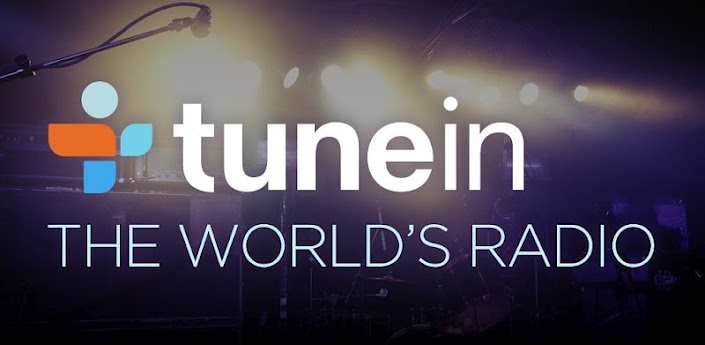
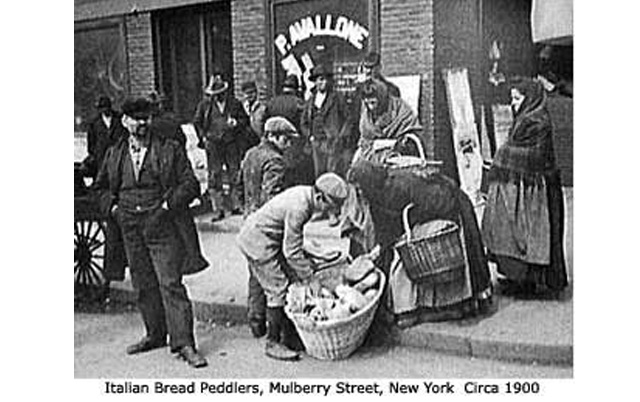
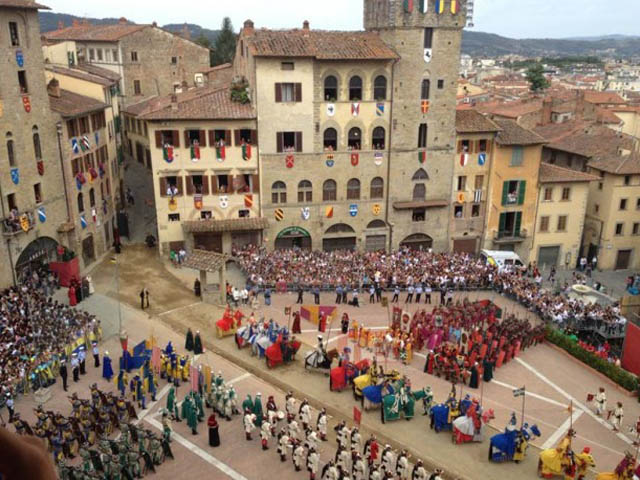

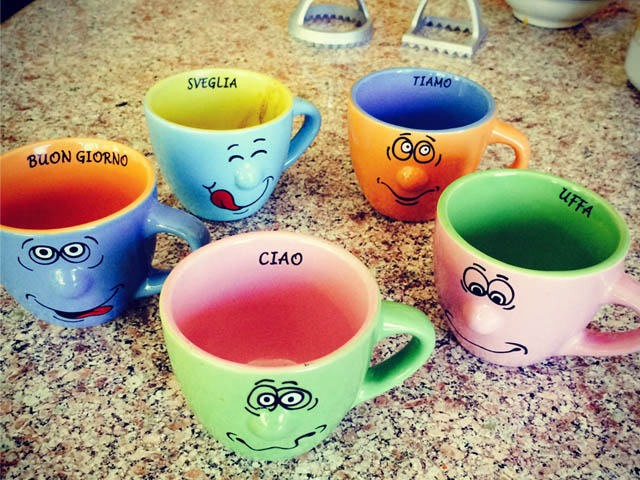






Grazie per la informazione, e molto interessante, Anke e’ un programma unico e stupendo e la combinazione di anke e duolingo fa un tool fortissimo per imparare.
Looking forward to reading the book and trying the app 😀
Grazie per un alta opportunita! Mi piace molto leggere in italiano e dopo, inglese! Sto provando usare ancora le mnemoniche nella mente senza memrise o computer, ma devo fermare e pensare per un buona idea. Non vedo l’ora per il suo libro. Grazie ancora una volta, Melissa!
Thank you for the information. I will anxiously await the book and app